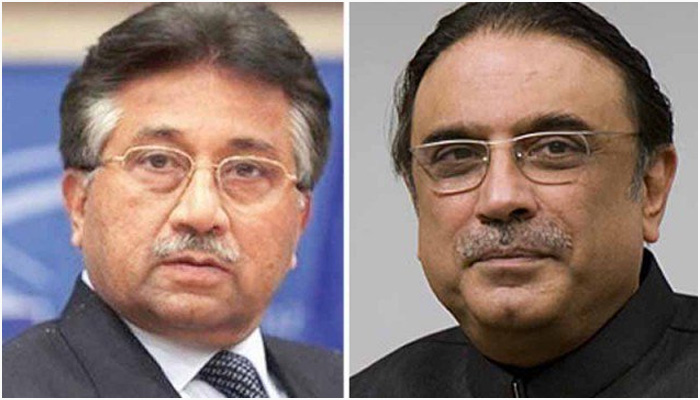NRO case: SC seeks asset details from Musharraf, Zardari, Qayyum
ISLAMABAD: The Supreme Court on Tuesday, while extending its jurisdiction, directed former presidents Gen (retd) Pervez Musharraf and Asif Ali Zardari as well as former attorney general Malik Qayyum to furnish the details of their assets and properties along with an affidavit.
A three-member bench, headed by Chief Justice Saqib Nisar and comprising Justice Umer Ata Bandial and Justice Ijaz-ul-Ahsan, was hearing a petition filed by the president of Lawyers Foundation for Justice, Feroz Shah Gilani, for the recovery of losses Pakistan had incurred after the promulgation of NRO.
Farooq H Naek, the counsel for Zardari, submitted before the court that the instant matter was related to the NRO and such an order could not be passed. However, the chief justice said they knew that and were extending their jurisdiction, adding that accountability should begin with the powerful.
The chief justice asked Naek to also submit assets details of his clients’ children, to which his reply was that both Zardari and Bilawal had recently submitted the details with the ECP in their nomination papers.
The chief justice said they could issue separate notices to Zardari’s children if the learned counsel wanted to do so. Naek contended that the properties of Benazir Bhutto were also transferred to her spouse and children. The chief justice, however, said it wasn’t the matter being considered by the court and added that he had great respect and regards for Benazir who embraced martyrdom.
Meanwhile, the court sought the assets details of all the respondents and adjourned further hearing for date-in-office (indefinite period). It is pertinent to mention that the petitioner, Gilani, had prayed the apex court to issue orders to recover the huge amount of public money misappropriated and wasted by the respondents through unlawful means already on record in different judgments of the Supreme Court and high court.
Earlier, submitting his reply before the apex court, Zardari had said he had no role in the promulgation of NRO, adding that he was in jail at the time of its promulgation. He had contended that the instant petition was frivolous and a classic example of a politically motivated petition in order to malign him so that maximum political damage was caused to the PPPP. Hence, he prayed the apex court to dismiss it forthwith.
Similarly, Musharraf in his reply had informed the Supreme Court that the NRO was promulgated without any mala fide or vested interest and all his actions were in accordance with the laws as existed at that time.
The former military dictator had contended that he promulgated the NRO on the advice of the government (through his channel) and it was declared void-ab-initio by the apex court in 2010.
He had submitted that the move aimed at fostering mutual trust and confidence amongst the holders of public office and remove the vestiges of political vendetta and victimisation, to make the election process more transparent and to amend certain laws for that purpose and for the matters connected therewith and ancillary thereto.
The NRO was promulgated in Oct 2007 by the government of the-then president Musharraf. Under the ordinance, the cases registered against politicians were removed, paving the way for many of them return to the country.
-
 'The Wrong Paris' Star Veronica Long Shares What New Crime Series 'Blue Skies' Is About
'The Wrong Paris' Star Veronica Long Shares What New Crime Series 'Blue Skies' Is About -
 King Charles Remains Immersed In Work Amid Andrew Scrutiny
King Charles Remains Immersed In Work Amid Andrew Scrutiny -
 Bobby J. Brown's Passing Adds To Growing List Of Celebrity Deaths In 2026
Bobby J. Brown's Passing Adds To Growing List Of Celebrity Deaths In 2026 -
 Prince William Fears For Andrew's Mental Health
Prince William Fears For Andrew's Mental Health -
 Paige DeSorbo Breaks Silence On New Relationship With Joe D'Amelio
Paige DeSorbo Breaks Silence On New Relationship With Joe D'Amelio -
 'Marshals' Showrunner Reveals If Kayce And Beth Will Cross Paths In 'Yellowstone' Spinoff
'Marshals' Showrunner Reveals If Kayce And Beth Will Cross Paths In 'Yellowstone' Spinoff -
 Belgium Watchdog Launches Antitrust Probe Into Google Ads Business
Belgium Watchdog Launches Antitrust Probe Into Google Ads Business -
 Andrew Ready To Fight Back: 'He's Very Vengeful'
Andrew Ready To Fight Back: 'He's Very Vengeful' -
 After Surpassing 100 Million YouTube Subscribers, BLACKPINK Returns With New Release
After Surpassing 100 Million YouTube Subscribers, BLACKPINK Returns With New Release -
 Rihanna Sends Fans Into Frenzy With BTS Footage Of Music Making: Watch
Rihanna Sends Fans Into Frenzy With BTS Footage Of Music Making: Watch -
 More Americans Say They Sympathise With Palestinians Than Israelis, Poll Finds
More Americans Say They Sympathise With Palestinians Than Israelis, Poll Finds -
 Princess Finally Releases Meghan Markle, Prince Harry's Photos
Princess Finally Releases Meghan Markle, Prince Harry's Photos -
 Victoria Beckham Makes Exciting Announcement Amid Ongoing Rift With Brooklyn Beckham
Victoria Beckham Makes Exciting Announcement Amid Ongoing Rift With Brooklyn Beckham -
 King Charles Receives Major Blow After Meghan Markle, Harry's Trip
King Charles Receives Major Blow After Meghan Markle, Harry's Trip -
 Kate Middleton Apologizes After Her Umbrella Bumps Child's Head
Kate Middleton Apologizes After Her Umbrella Bumps Child's Head -
 Retired US Fighter Pilot Arrested Over Alleged Training Of Chinese Military
Retired US Fighter Pilot Arrested Over Alleged Training Of Chinese Military




